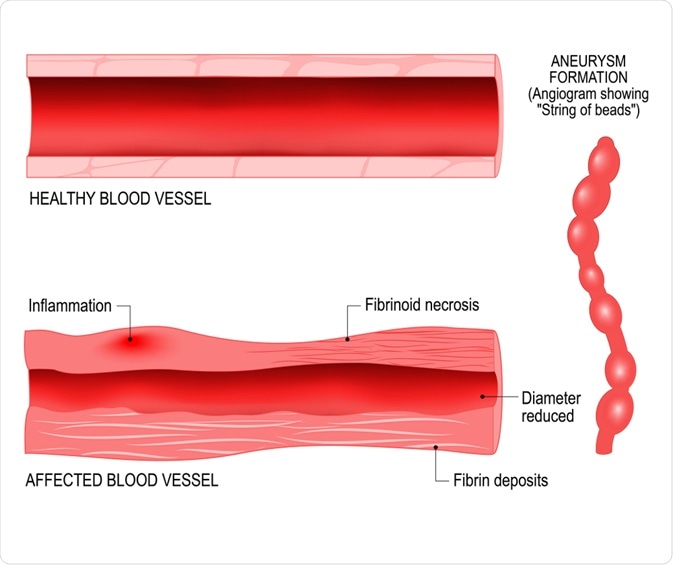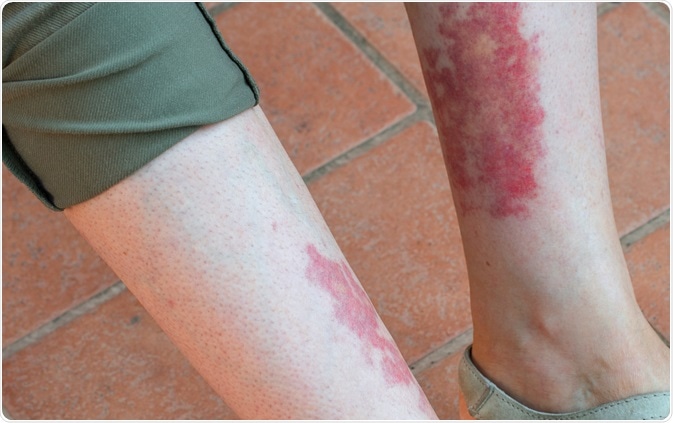Vasculitis literally means inflammation of blood vessels and includes many different conditions. There are various different causes and types of vasculitis, which lead to specific symptoms and management.
 Vasculitis is the inflammation of blood vessels. Image Credit: Designua / Shutterstock.com
Vasculitis is the inflammation of blood vessels. Image Credit: Designua / Shutterstock.com
Causes
The majority of vasculitis cases are idiopathic in nature, meaning that no specific cause has been identified.
Infection accounts for 15-20% of affected individuals and roughly the same proportion results from inflammatory diseases. 1 in 10 of all reported cases of vasculitis arises from the use of medication or exposure to chemicals.
Types
There are many common types of vasculitis including:
- Giant cell arteritis leads to the inflammation of medium and large arteries, commonly those in the head and neck. Common symptoms of this type are aching around the temples, muscle pain in the jaw and loss of vision. Elderly people are more susceptible to the condition, although the cause is unclear.
- Polymyalgia rheumatic leads to inflammation, pain and stiffness in the shoulder, neck and hip muscles. Women are twice as likely as men to experience this, particularly elderly women.
- Takayasu arteritis affects the coronary artery, which gradually becomes narrower and reduces blood supply to the body.
- Polyarteritis nodosa involves damaged and inflamed small and medium arteries. The blood vessels that supply blood to the gastrointestinal tract, kidneys and nerves are often affected to a greater extent and can cause internal bleeding in these areas. It can also block an artery entirely, causing potentially serious outcomes.
- Kawasaki disease affects the small and medium arteries of young children. Characteristic symptoms include continued fever, rash, swollen glands, red eyes, lips, tongue or mouth. As it can also affect coronary arteries, heart complications may arise.
- Granulomatosis with polyangiitis is also known as Wegener’s granulomatosis and affects the vessels supplying blood to the nose, sinuses, ears, kidneys and lungs. It is potentially fatal in the case of tissue damage and kidney impairment and prompt medical treatment is, therefore, essential. Other symptoms may include fever, sinusitis and shortness of breath.
- Eosinophilic granulomatosis with polyangiitis is also known as Churg-Strauss syndrome and causes symptoms of allergic sinusitis and asthma. It usually affects adults and includes various symptoms such as fatigue, fever, muscle ache and weakness.
- Microscopic polyangiitis commonly affects blood vessels in the lungs, kidneys and nervous system. Common symptoms include hypertension, kidney impairment, anemia and shortness of breath.
- Henoch-Schönlein purpura usually affects children and is characterized by a skin rash and pain of the stomach and joints. It often occurs after a recent infection and is self-limiting, rarely leading to serious outcomes.
In addition, there are many other types of vasculitis that are less commonly seen in practice.
 A case of leukocytoclastic vasculitis, small blood vessel inflammation. Image Credit: Sarah2 / Shutterstock.com
A case of leukocytoclastic vasculitis, small blood vessel inflammation. Image Credit: Sarah2 / Shutterstock.com
Diagnosis
When a case of vasculitis is suspected upon presenting symptoms and physical examination, the diagnosis can be confirmed with one of various tests. The most common tests used in practice are biopsy, angiography and blood tests.
The type of vasculitis can usually be determined when it is understood which blood vessels and organs are affected. Some types, such as Kawasaki disease, are usually diagnosed on clinical findings alone and neither biopsy nor angiography is usually required. When blood tests are used as a diagnostic tool, elevated antineutrophil cytoplasmic antibodies are the most useful parameter to be considered.
Management
In most cases, the aim of treatment is to inhibit inflammation, which is usually done by immune system suppression. Steroid medications such as prednisolone are often used in many types of vasculitis along with other immunosuppressant drugs such as cyclophosphamide.
Additionally, specific organs that are affected often need specialized treatment to maintain function and reduce the risk of serious complications when the condition is most severe.
References
Further Reading
Last Updated: Feb 9, 2021